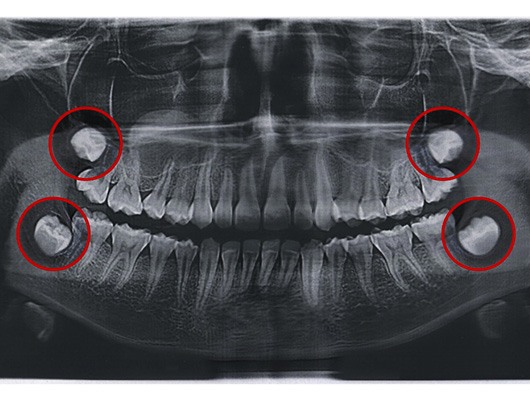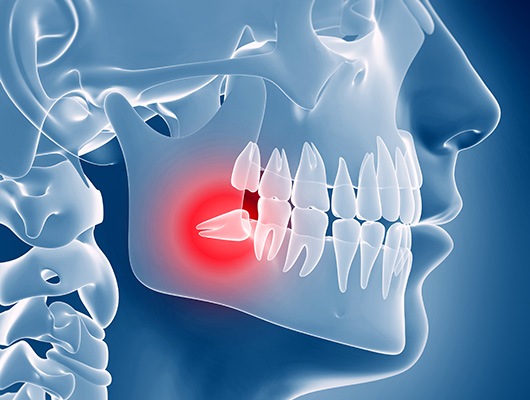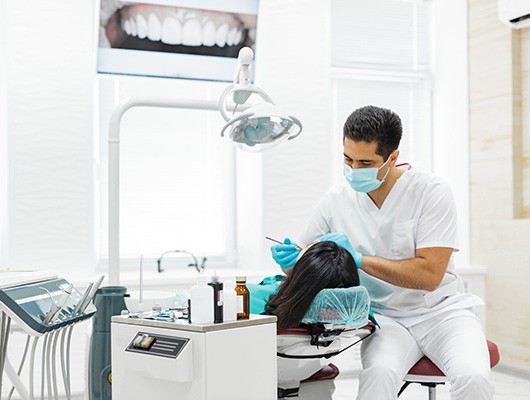Wisdom Tooth Extractions—Denton, TX
A Smile’s Rite of Passage

For some people, the wisdom teeth appear during their teen years, and for others, it’s not until they are in their mid-twenties. Nonetheless, they tend to cause nothing but problems no matter the person’s age.
That’s why Dr. Ahir is happy to offer wisdom tooth extractions in Denton for patients of all ages. He can keep an eye on these troublesome teeth during regular checkups so he can recommend their removal before they cause any major issues.
But, if they are already creating pain and other problems for you or your teen, we won’t make you wait to get the treatment you need—click here to schedule an appointment right away.
WHY CHOOSE PRIME DENTISTRY FOR WISDOM TOOTH EXTRACTIONS?
- Dentist with 20+ Years of Experience
- Highly Individualized Dental Treatment
- Accept Many Popular Dental Insurance Plans
What are Wisdom Teeth?

The wisdom teeth are actually our third set of molars, and they tend to (try to) come in between the ages of 16-25.
They were very useful for our caveman ancestors and their rough diets, as they would usually have worn through their other molars by this age. They get their name because they erupt later in life compared to the rest of the teeth when the person should hopefully be wiser.
Why Do Wisdom Teeth Need to Be Removed?

Often, the wisdom teeth don’t have enough room to come in properly, leading to a litany of issues. Dr. Ahir will typically recommend a wisdom tooth extraction if they are…
- Causing persistent pain and soreness toward the back of the mouth
- Placing pressure on the nearby teeth
- Coming in at an odd angle or horizontally
- Forcing the back teeth and bite out of alignment
- Creating a flap in the gums that is trapping food and bacteria
- Developing infections and/or cysts
What to Expect from the Wisdom Teeth Procedure

Dr. Ahir will examine the wisdom teeth as part of a patient’s routine checkup, monitoring them with X-rays. If he sees signs that they will cause any of the symptoms listed above (or if they already are), he will sit down with the patient and discuss a wisdom tooth extraction.
For the treatment itself, there are two types. A simple extraction is for wisdom teeth that have fully erupted—the mouth is numbed before the tooth is gently wiggled so it slips out on its own.
However, if the wisdom teeth are still within the gum and bone tissue, Dr. Ahir will perform a surgical extraction. This involves numbing the mouth and removing any tissue that prevents access to the tooth. This allows him to create a clear path for the extraction.
Recovering from Wisdom Teeth Extraction

Most patients feel back to normal within a week of the procedure. In that time, their first few days of recovery are the most important.
A patient should NOT drink from a straw, smoke, or engage in any rigorous physical activity in the first 24-48 hours, as this can prevent the formation of a blood clot. This protects the sensitive bone and nerves exposed following an extraction.
It’s also wise to follow a soft food diet initially, mostly consisting of items like (not too hot) soup, yogurt, scrambled eggs, pudding, and basically anything that doesn’t require a lot of chewing.
Understanding the Cost of Wisdom Tooth Extractions

Before you get wisdom tooth removal, you’ll want to learn its price first. That’s only natural; you won’t know whether care fits your budget otherwise. Just know that the treatment’s cost varies by patient, so you’ll need to consult Dr. Ahir for a final estimate. Our team will also strive to make your procedure affordable, walking you through its price factors, dental insurance, etc. For more details on the cost of wisdom tooth extractions, just keep reading or call us.
Read MoreFactors That Affect the Cost of Wisdom Tooth Extractions

As part of your consultation, we’ll closely examine your smile – its teeth, gums, etc. This exam closely checks factors that affect the cost of your wisdom tooth extraction, such as:
- Wisdom Teeth Number – Removing many wisdom teeth costs more than extracting one. Indeed, your treatment’s price will rise with every extra tooth that needs extraction.
- Impaction – Impacted wisdom teeth are trickier to extract, so their removal costs more. The type of impaction also affects the price.
- For a soft tissue impaction, treatment isn’t much pricier than usual. It’s fairly easy to remove a wisdom tooth that’s partly emerged from the gums.
- In contrast, a bony impaction can prove costly. Removing a tooth lodged in the jawbone is complex and intensive work.
- Role of Sedatives – An extraction will sometimes require (or strongly benefit from) dental sedation. However, adding sedatives to your care will increase its price.
- Specialist Type – If you need a complex wisdom tooth extraction, you’ll require an oral surgeon. That means you must pay more for their higher level of expertise.
Does Dental Insurance Cover Wisdom Tooth Extractions?

While dental plans don’t always cover wisdom tooth removal, many offer some benefits. That said, you’d have to meet your deductible and maximum to enjoy them. You could also see an in-network dentist to reduce out-of-pocket costs further.
All the same, please confirm your plan’s benefits (if any) before pursuing treatment. Our dental team will gladly help you do so if necessary.
How to Make Wisdom Tooth Extractions Affordable

Of course, insurance isn’t the only way to make wisdom tooth extraction affordable. You can also rely on our practice’s helpful payment options to reduce the cost! Here at Prime Dentistry, we provide the following:
- In-House Savings Plan – If you join our in-house savings plan, you’ll get a 15% discount on wisdom tooth extraction. You’d just need to pay an annual fee of $249.
- Dental Financing – Prime Dentistry is proud to work with several 3rd party financiers, including CareCredit, Cherry Financing, SunBit, and more. Through their help, you could pay for your wisdom tooth extraction in manageable monthly installments.
Your wisdom tooth extraction needn’t drain your budget. Instead, visit our office for care that’s affordable and effective!
Wisdom Tooth Extraction FAQs
How Should I Prepare for My Wisdom Tooth Extraction?
Preparing for wisdom tooth extractions in Denton starts with following Dr. Ahir’s pre-op instructions. Typically, this means arranging for a friend or family member to drive you home, since you may feel a little groggy after your procedure.
You should also eat a good meal before your appointment to ensure you don’t get hungry during your procedure—just make sure you brush and floss afterward. Next, be sure to wear comfortable clothing as you may be sitting in the chair for a while.
At home, head to the grocery store and stock up on soft foods, ice packs, and any prescribed medications. Being prepared helps you feel more at ease and ensures a smoother recovery from your extraction.
How Do You Make Wisdom Teeth Pain Go Away?
Unfortunately, the only way to stop wisdom tooth pain once it starts is to have them removed. However, you can manage the discomfort before your procedure in several ways. For example, you can use over-the-counter pain relievers, apply a cold compress to the outside of your jaw, or rinse with warm salt water to lessen irritation.
These solutions will keep your pain in check until you can get to our office. Once your wisdom teeth are removed, the discomfort will start to fade within a few days. Not only will you feel better, but your oral health will also improve as the procedure eliminates pressure and prevents infection.
Is Wisdom Tooth Removal Painful?
Pain is usually one of our patient’s top concerns when it comes to extraction—it's only natural. But you can rest easy knowing that we keep your comfort at the top of our priorities during every procedure, especially wisdom tooth extractions.
Before treatment begins, Dr. Ahir will use a local anesthetic to numb your mouth completely, so you don’t feel pain. You may experience pressure as the tooth is removed, but nothing sharp or intense.
Afterward, mild soreness or swelling is common for a few days, but by following Dr. Ahir’s instructions, you’ll be back on your feet in no time.
What’s the Best Age to Get Wisdom Teeth Removed?
While there is no “best” age when it comes to wisdom tooth extractions in Denton, we usually recommend it be performed between ages 17 and 25. In this age range, the roots of your teeth aren’t fully developed, making removal easier and recovery faster.
Waiting until later in life can make the procedure more complicated and increase the risk of complications, like impacted teeth or infection. However, not everyone needs their wisdom teeth removed! Some people have perfectly healthy smiles even after their third molars erupt.
If you’re concerned about your wisdom teeth, let us know. We’ll examine your mouth thoroughly to see if your oral health is in any danger and then take action to save your smile.





New Patient 1st Visit
Second Opinions

